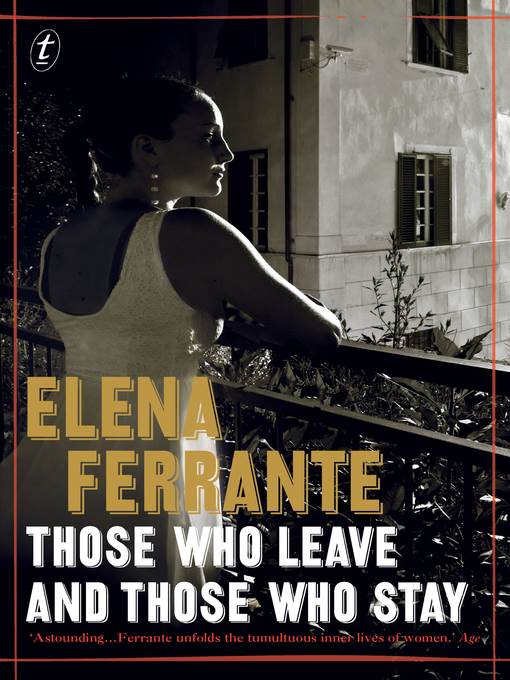Since the publication of the acclaimed My Brilliant Friend and The Story of A New Name, Elena Ferrante’s reputation has grown enormously. Her novels about the friendship between Lila and Elena, about the mysteries of human relationships, are utterly compelling.
In Those Who Leave and Those Who Stay, the two protagonists are now in their thirties. Lila, married at sixteen, has left her husband and the comforts of her marriage, and has now joined the workforce. Elena has left the neighbourhood in Naples, been to university, and published a successful novel, all of which has brought her into a wealthier, more cultured world. Both women are seizing opportunities to flee a life of poverty, ignorance and submission. Yet they are still very much bound to each other by an unbreakable bond.
Elena Ferrante was born in Naples. She is the author of seven novels: The Days of Abandonment, Troubling Love, The Lost Daughter, and the quartet of Neapolitan Novels: My Brilliant Friend, The Story of a New Name, Those Who Leave and Those Who Stay, and The Story of the Lost Child. She is one of Italy’s most acclaimed authors.
Ann Goldstein is an editor at the New Yorker and a recipient of the PEN Renato Poggioli Translation Award.
‘[Ferrante’s] charting of the rivalries and sheer inscrutability of female friendship is raw. This is high stakes, subversive literature.’
Sunday Telegraph‘In the past decade, no fiction writer has made it more necessary to think about the performative aspect of being a woman than Elena Ferrante. Her novels, written originally in Italian and translated beautifully by Ann Goldstein, are ferociously engaged with the ways in which a woman—as a daughter, a teenager, a lover, and, most dramatically, a mother—is a kind of person in drag, speaking through a costume that slowly becomes all that one knows of her…It’s Ferrante’s ability to capture both the mirror and the woman standing before it that makes her a writer to be reckoned with.’ John Freeman
‘Nothing you read about Elena Ferrante’s work prepares you for the ferocity of it…This is a woman’s story told with such truthfulness that it is not so much a life observed as it is felt.’ New York Times
‘Elena Ferrante is one of the great novelists of our time…In these bold, gorgeous, relentless novels, Ferrante traces the deep connections between the political and the domestic. This is a new version of the way we live now—one we need, one told brilliantly, by a woman.’ New York Times Sunday Book Review
‘When I read [the Neapolitan novels] I find that I never want to stop. I feel vexed by the obstacles—my job, or acquaintances on the subway—that threaten to keep me apart from the books. I mourn separations (a year until the next one—how?). I am propelled by a ravenous will to keep going.’ New Yorker
‘It is a testament to Ferrante’s achievement that, at the end of this third book and anticipating the fourth, it seems there’s limitless potential for Lina to reinvent herself again.’ Times Literary Supplement
‘Ferrante’s project is bold: her books chronicle the inner conflicts of intelligent women…Her writing has a powerful intimacy…a bona fide literary sensation–the famous writer nobody knows.’ Guardian UK
‘The best thing I’ve read this year, far and away…She’s marvellous.’ Richard Flanagan



























دیدگاه کاربران